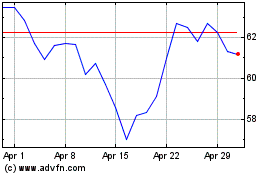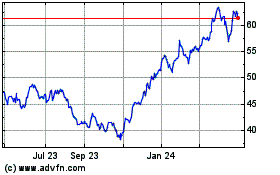Visa Inc. (V), the world's largest payments network, posted a
46% increase in fiscal second-quarter profit as it benefited from
higher transaction volume and the remeasurement of net-deferred tax
liabilities.
The San Francisco-based company said Wednesday that cardholders
made 13 billion transactions with their Visa credit and debit
cards, up 8% from a year earlier. The dollar volume of payments
made also increased 11% to $956 billion.
The results follow a positive quarterly earnings report earlier
Wednesday from Visa's smaller rival, MasterCard Inc. (MA), which
said its profit rose 21.2% thanks to higher card use and
market-share gains in the U.S. debit-card market.
While big banks like Bank of America Corp. (BAC), J.P. Morgan
Chase & Co. (JPM) and Citigroup Inc. (C) have struggled to grow
credit-card loans as consumers avoid carrying balances, the actual
use of cards has remained strong because customers continue to
ditch cash and checks in favor of plastic.
That has helped Visa and MasterCard, which operate networks that
facilitate card transactions for cardholders' and merchants' banks,
but do not actually lend or issue cards to consumers. The more
transactions routed over their networks, the more revenue Visa and
MasterCard can make.
Visa raised its guidance for earnings per share for the year to
growth in the "high teens to low twenties," from an earlier
forecast of growth in the high teens.
Visa's and MasterCard's shares have risen more than 20% and 21%,
respectively, over the last year. Visa's shares were up 3.9% at
$127 after hours Wednesday. MasterCard's shares closed down 1% at
$451.45.
"Our strong financial performance this quarter was fueled by
continued growth of U.S. credit products, strong cross border
spending and expansion of Visa's core business in international
markets," Joseph Saunders, chairman and chief executive officer of
Visa, said in a statement.
Visa posted a profit of $1.29 billion, or $1.91 per share, up
from $881 million, or $1.23 per share, a year earlier.
Excluding the one-time, non-cash benefit, net income was $1.1
billion, or $1.60 per share.
Revenue rose 14.8% to $2.58 billion.
The results beat analysts' estimates, which projected earnings
of $1.51 per share on $2.48 billion in revenue.
Visa and MasterCard have been responding to new rules that took
effect in October capping how much large banks can collect from
merchants each time a consumer swipes a debit card. The rules,
known as the Durbin amendment, take aim at fees called interchange,
which are set by Visa and MasterCard but collected by card-issuing
banks as revenue.
A separate provision, which took effect in April, requires all
banks have at least two unaffiliated processing networks on their
debit cards to give merchants a choice over which to route.
MasterCard, which has a significantly smaller share of the U.S.
debit-card market, attributed some of its recent gains to the new
rules. Its processing capability is equipped on about half of U.S.
debit cards, up from 25% before the regulation took effect. Its
share of debit transactions that consumers authorized with a PIN
surpassed 20% last month, up from high single digits last year.
In the past a bank might have used Visa to process debit-card
transactions authorized with a consumer's signature and Visa's
Interlink debit network to authorize transactions made with a
personal identification number, or PIN. Such deals are no longer
allowed, meaning that same bank must either add a PIN debit network
not operated by Visa, such as MasterCard's Maestro network, to its
cards or replace Interlink entirely with a different provider.
The requirement is expected to have a bigger effect on Visa,
which had more exclusive arrangements with its bank clients than
MasterCard, while potentially giving a slight boost to MasterCard,
which has a significantly smaller share in the debit-card
market.
Visa has "more debit share to lose," said Darrin Peller, an
analyst with Barclays, adding that both companies are "paying a
little more attention to ... bigger merchants with bigger rebates
and incentives."
As part of its post-Durbin strategy, Visa also introduced
several fee changes that directly affect merchant acquirers, or
companies that contract with merchants to process card payments.
The changes involve the addition of a new fixed fee based on
merchant size, number of locations and monthly volume, while
reducing existing variable fees assessed on each transaction.
The intent is to entice merchants to continuing routing
transactions over its network, which should result in a net savings
for retailers, Visa has said.
Merchant acquirers are ultimately expected to pass along the fee
changes to their retail clients.
Another cloud that looms over the companies is a series of more
than 50 lawsuits filed by merchants including Kroger Co. (KR),
Payless ShoeSource and Safeway Inc. (SWY) and several trade groups.
The suits, which also name several large banks that issue Visa and
MasterCard cards, take aim at the so-called swipe fees retailers
pay on credit-card transactions.
Visa and MasterCard have been working toward a settlement of the
suits, which are set to go to trial in U.S. District Court in
Brooklyn in September. Analysts have pegged the value of a possible
settlement at $6.5 billion based on recent actions by Visa and
MasterCard.
MasterCard took a $770 million pre-tax charge in the fourth
quarter based on progress made in the suits. Visa said in December
it was depositing $1.6 billion into a litigation escrow account set
up to pay for a settlement, bringing the total in the account to
about $4.3 billion.
Executives for both companies have said they would not agree to
any long-term cut to credit-card swipe fees, though analysts expect
the fees could be reduced temporarily as a result of a settlement.
In addition, they also expect Visa and MasterCard to eliminate some
of the rules they impose on merchants, including one that prohibits
surcharging customers who pay with plastic.
-By Andrew R. Johnson, Dow Jones Newswires; 212-416-3214;
andrew.r.johnson@dowjones.com
Citigroup (NYSE:C)
Historical Stock Chart
From Mar 2024 to Apr 2024

Citigroup (NYSE:C)
Historical Stock Chart
From Apr 2023 to Apr 2024
